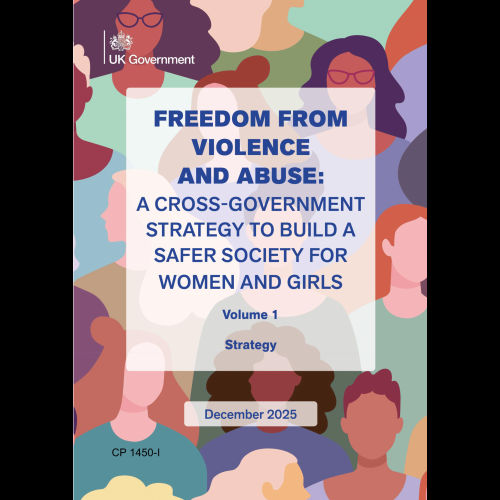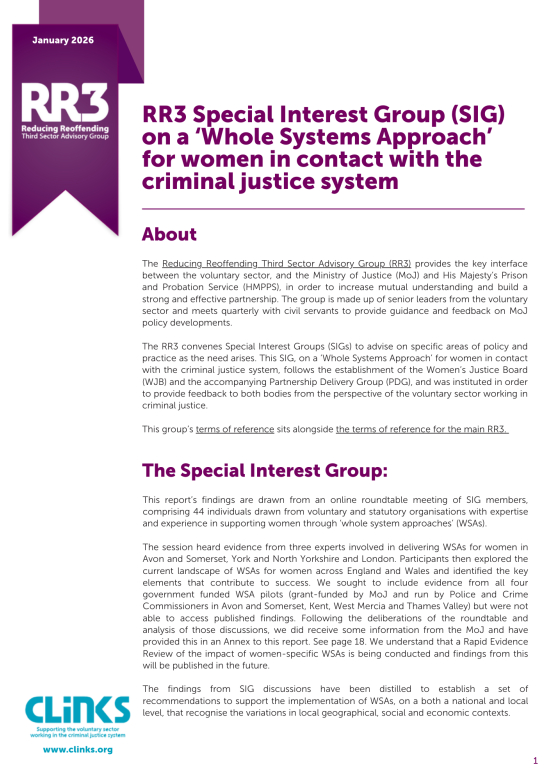This guest blog is by Laura Seebohm from Changing Lives who was recently recruited onto the Reducing Reoffending third Sector (RR3) group. The RR3 is a platform for leaders from the voluntary sector to engage with the Ministry of Justice, chaired by Clinks. Laura’s specialism is women in the criminal justice system.
I am responsible for women’s services for a medium-sized charity called Changing Lives. We operate across the North and Midlands, focusing on homelessness, addictions and recovery, employment and women’s services. Sitting on this group as someone who works with service users whose voices have often gone unheard raises important questions about representation and the diversity of perspectives in the women’s sector and amongst women in contact with the criminal justice system themselves.
I moved to Changing Lives from the probation service 11 years ago as it became overwhelmingly clear that the needs of the women I was supporting were nowhere close to being understood, and no-one else was operating within this space in the North East. At first, our women’s service was just me – we have developed and grown considerably since that time – but as a feminist I remain as committed to the notion of ‘by women, for women’ as I was back then.
To support and inform my role on the RR3, I will also chair quarterly Women’s Network Forum meetings which are an opportunity for managers and leaders within the women’s sector to come together and explore policy and campaigning priorities, and to network. This is led by Clinks and carried out in partnership with Agenda and the Women’s Resource Centre. We want to ensure these forums meet your information needs, and work as a route to influencing policy for the sector.
The values of the women’s sector
Attendance at the forums will remain limited to women-centered services. There is ongoing debate around the nature of organisations to be included within ‘the women’s sector’. Throughout my work, I have come to the position that it is all about values. Tracing back to the origins of women’s services is important. If a generic organisation has made a decision to move into the women’s sector solely because there is opportunity for growth we should absolutely challenge that. But any charity which identifies unmet needs for women in their communities should have space to respond and deliver gender-specific services, so long as they are women-centered, work to empower women, are embedded within communities and build capacity rather than competition for other specialist providers.
I believe it is vital for the sector to be made up of diverse range of organisations in terms of size, geography and approaches. This time of austerity has been catastrophic for too many of our specialist services; but there are also opportunities to innovate and develop new ways of providing women-centred services. The need to find creative responses to sustain the sector has never been more important. For this to happen, we need to focus on diversity - who is in the room? Whose voices are we listening to and whose voices are missing? If we keep hearing the same voices in the same networks our potential for influence and change will be limited.
We all operate in different contexts, across different landscapes. The diversity of the sector can only bring greater insight and understanding of systems which can so often work against the needs of women. This requires trust and a commitment to the values and principles which will build capacity and sustainability for the sector rather than individual gain. So long as these are in place, I believe there is room for all.
Continuing this conversation
I really hope to continue this conversation and to hear diverse views, and I am sure I will. I would also hope that this is something that can be explored at the Women’s Network Forums so we can ensure meetings are genuinely meaningful and take us forward to ensure that our voice is heard at policy level. Our proposal for the format of meetings going forward is as follows:
- Four meetings during 2018 in London, York, Bristol, and Liverpool, to be a vehicle for me to feed the women’s sector priorities into quarterly RR3 meetings
- Reaching out to a wider range of women-centred services nationally
- Use the forum as a vehicle to update the sector on policy and campaigns which are going on, and an opportunity for the sector to influence at a national level
- Include specialist speakers to share learning and good practice
- Policy roundtables at end of the meeting to drill down into the detail around recurring concerns raised by the sector to identify useful responses.
We are really excited to launch the programme of four meetings over the coming year as follows (venues to be confirmed):
- 20th February – London
- 8th May - York
- 4th September – Bristol
- 13th November – Liverpool
Please save the dates and come along if you can; all our voices are important to build strength for the women’s sector.
You can find details of upcoming events at www.clinks.org/events
What's new
Blogs
Violence Against Women and Girls (VAWG) Strategy Blog
Publications
RR3 Special Interest Group (SIG) on a ‘Whole Systems Approach’ for women in contact with the criminal justice system
The RR3 SIG drives a Whole Systems Ap
Latest on X
The role is for a leader from an organisation focused on racially minoritised people, with expertise in service delivery, policy, advocacy, or related areas in criminal justice. Racial disparities are present at every CJS stage. This role ensures these voices are central in shaping policy to help address and eradicate them. Apply by Mon 18 Nov, 10am. More info: https://www.clinks.org/voluntary-community-sector/vacancies/15566 #CriminalJustice #RR3 #RacialEquity

